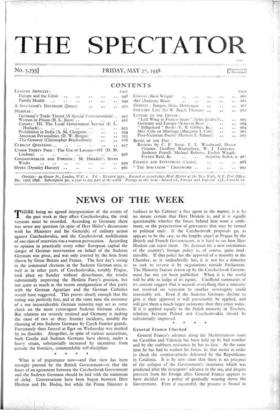What is of importance now—and that view has been strongly
pressed by the British Government—is that the bases of an agreement between the Czechoslovak Government and the Sudeten Germans should be laid with the minimum of delay. Conversations have been begun between Herr Henlein and Dr. Hodza, but while the Prime Minister is (subject to his Cabinet) a free agent in the matter, it is by no means certain that Herr Henlein is, and it is equally questionable whether the forces behind him want a settle- ment, or the perpetuation of grievances that may be turned to political ends. If the Czechoslovak proposals go, as appears to be the case, to the lengths urged at Prague by the British and French Governments, it is hard to see how Herr Henlein can reject them. His demand for a new orientation of the country's foreign policy is, of course, quite inad- missible. If that policy has the approval of a majority in the Chamber, as it undoubtedly has, it is not for a minority to seek to reverse it by negotiations outside Parliament. The Minority Statute drawn up by the Czechoslovak Govern- ment has not yet been published. When it is the world will be able to judge of its equity. Unofficial summaries of its content suggest that it accords everything that a minority not resolved on secession to another sovereignty could reasonably ask. Even if the Sudeten Germans decline to give it their approval it will presumably be applied, and will give them a much larger autonomy than they enjoy today. If it is applied equally to the Polish minority in Teschen, relations between Poland and Czechoslovakia should be substantially improved.
* *


















































